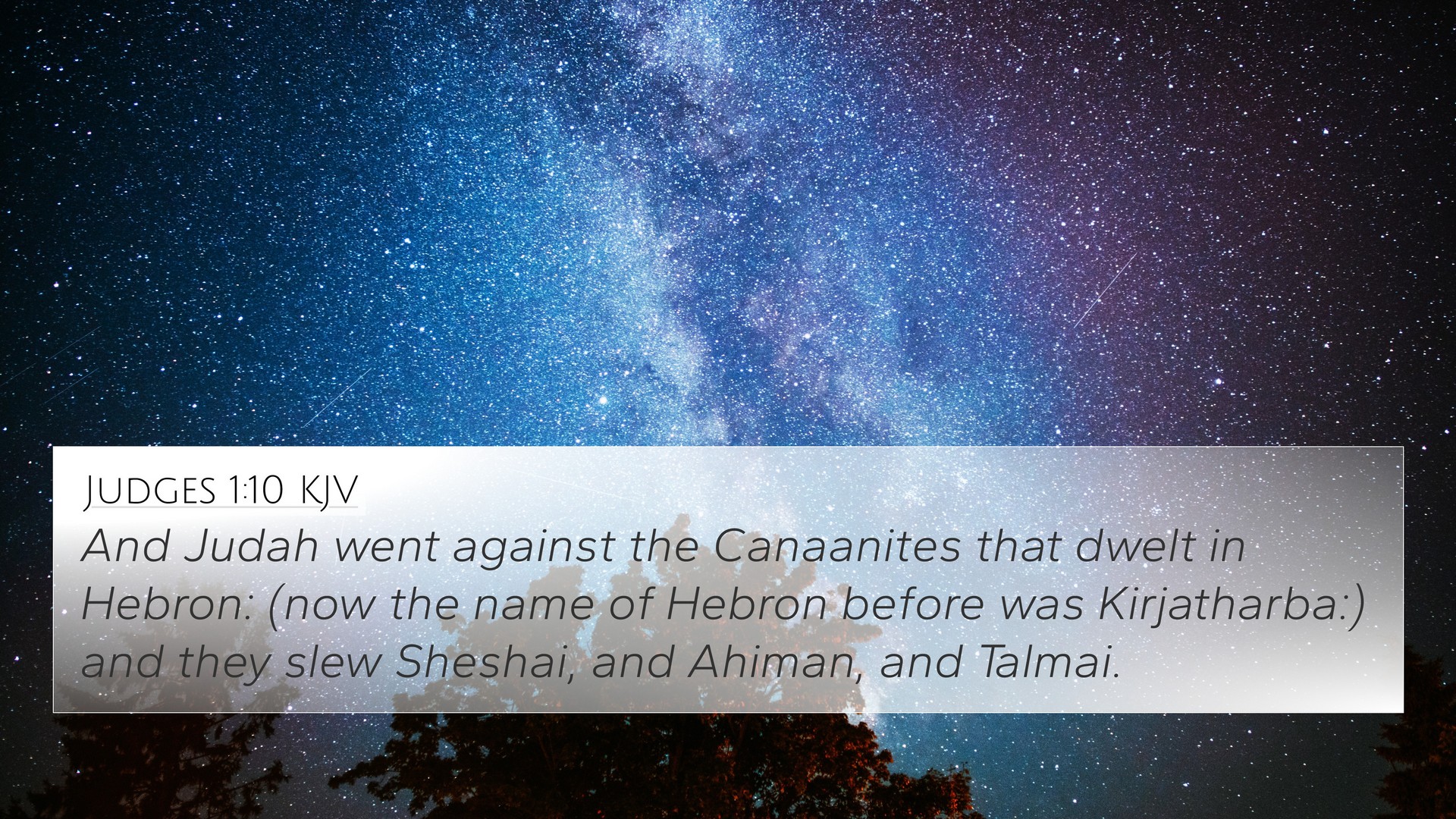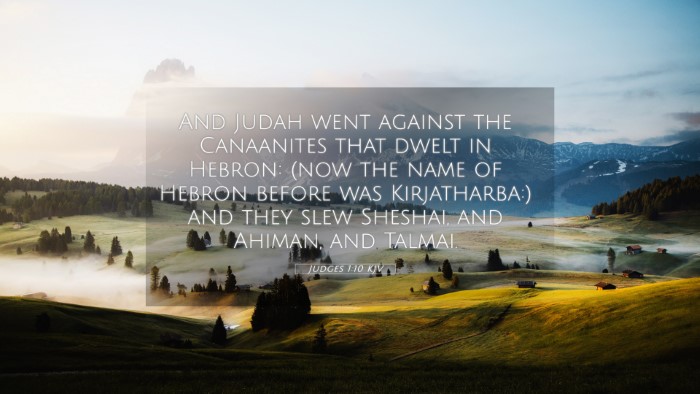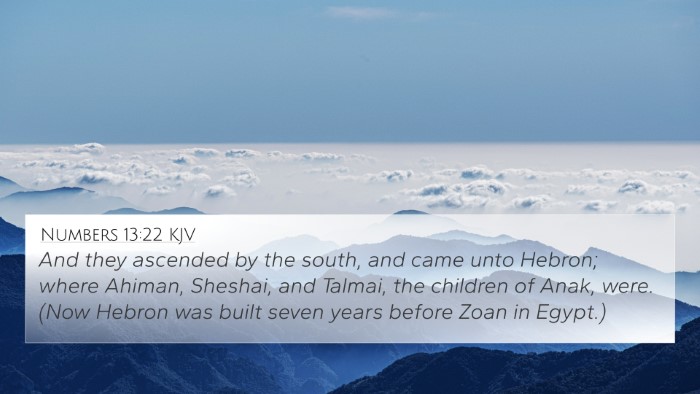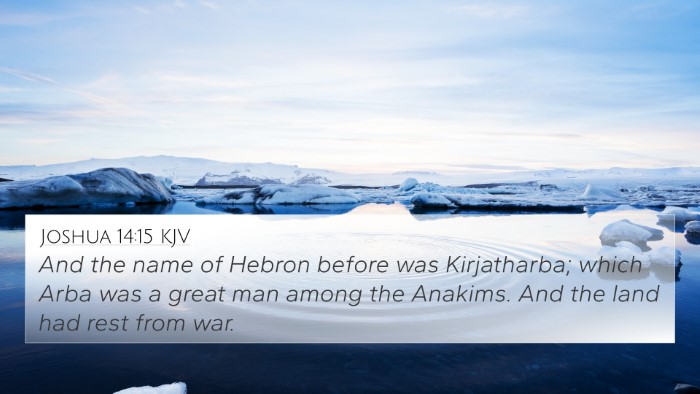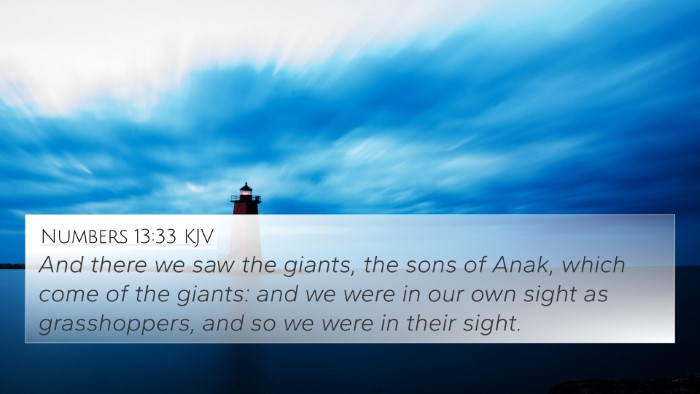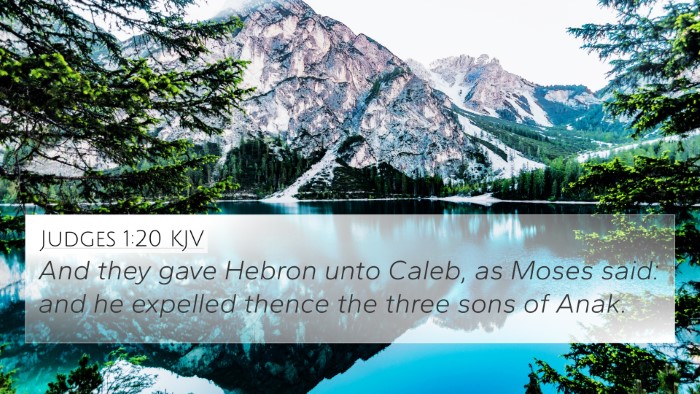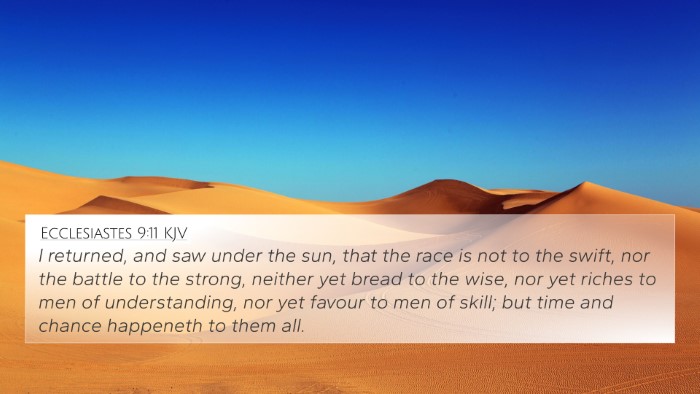Understanding Judges 1:10
Judges 1:10 states, "And Judah went against the Canaanites that dwelt in Hebron: now the name of Hebron before was Kirjatharba." This verse marks the beginning of the Israelite conquest in the land of Canaan, emphasizing the bravery and initiative of the tribe of Judah.
Contextual Overview
In the Book of Judges, we observe a recurring cycle of Israelite disobedience, oppression, crying out to God for help, and deliverance through the appointed judges. This period follows the death of Joshua, wherein Israel must assert its claim to the Promised Land. Judah’s actions in this verse set the tone for the leadership role they will play among the tribes of Israel.
Commentary Insights
Matthew Henry's Commentary:
- Judah's Leadership: Henry notes that Judah’s decision to lead the charge reflects a theme of unity among the tribes. They step forward as the first among equals to take possession of the land.
- Strength in Numbers: The mention of "went against the Canaanites" highlights the need for strength in collective action. Judah recalls the significance of brotherhood in faith as crucial in this endeavor.
- Historical Significance of Hebron: Henry elaborates on Hebron's past, formerly known as Kirjatharba, linking it to Abraham and the great patriarchal promises, suggesting divine providence in the choice of target.
Albert Barnes' Notes:
- Military Strategy: Barnes points out that Judah’s alliance with Simeon signifies a strategic military approach, where cooperation is essential for victory.
- Divine Favor in Conquest: He emphasizes the belief that God's blessings are upon those who take initiative, highlighting Judah's faith in God’s promises of triumph over their enemies.
- Theological Implications: The reference to the name change from Kirjatharba to Hebron serves as a reminder of God's covenant with His people—where previous names hold significant weight in the narrative of faith.
Adam Clarke's Commentary:
- The Role of Hebron: Clarke underscores Hebron’s importance as a historic city for the Israelites, suggesting that its capture symbolizes a reclaiming of God-given promises.
- Cultural Context: He points out the significance of the Canaanite occupants' defeat as a necessary step in fulfilling the mandates given to the Israelites.
- Prophetic Foreshadowing: Clarke sees this moment as prophetic, prefiguring King David’s future reign, as Hebron will become a significant city in his kingship.
Cross-References
This verse connects deeply with various scriptures throughout the Bible. Here are some notable cross-references that enrich our understanding:
- Genesis 23:2: The significance of Hebron as the burial site of Sarah and a place of deep historical roots for Israel.
- Joshua 14:12: Caleb's claim to Hebron, showing the promise of land to the faithful.
- Hebrews 11:9: Acknowledgment of Abraham’s faith regarding the land promised to his descendants.
- 1 Chronicles 2:50-52: The genealogical roots of the tribe of Judah, providing context to their status among the Israelites.
- Romans 8:31: Encouragement that, with God on their side, Judah’s actions are vindicated.
- Matthew 1:3-6: The issues of lineage, linking Judah to the royal line leading to Jesus.
- Revelation 5:5: The Lion of the tribe of Judah as a symbol of victory and kingship, reflecting the triumph initiated in this verse.
Thematic Connections
The themes emerging from Judges 1:10 resonate throughout the scripture, illustrating victory through faith, the fulfillment of promises, and the importance of God's covenant with His people. This verse serves as a pivotal moment that resonates through the narratives of the Old and New Testaments. Understanding this verse requires an analysis of its implications within the broader biblical canon.
The cultivation of the theme of leadership is vital. Judah takes on a leading role among the tribes, indicative of the expected traits of leaders—faith, courage, and a reliance on divine support. These themes recur, showing how biblical narratives often communicate intertwined lessons.
Conclusion
Judges 1:10 offers profound insights into the history and faith of the Israelite people. By examining this verse alongside public domain commentaries and cross-referencing it with related scriptures, we gain a richer understanding of the importance of collective faith and action in the biblical narrative. Through tools such as a Bible concordance and Bible reference resources, we can further deepen our study, identify connections, and prepare meaningful teachings that reflect the intricate weaving of the Biblical text.
How to Utilize Cross-References
Engaging in cross-referencing Bible study methods enables you to explore the thematic connections and direct relationships among various scriptures. There are several techniques to effectively dissect and analyze related verses:
- Use a Bible Cross-Reference Guide: Leveraging guides can help locate verses that are thematically linked.
- Implement a Comparative Bible Verse Analysis: Comparing narratives or themes can reveal deeper insights.
- Look at Patterns and Recurrences: Identifying repeated themes can enhance understanding of how various verses support each other.
- Explore Inter-Biblical Dialogue: Studying how different texts relate to each other across both the Old and New Testaments.
- Attend to Context: Understanding historical and cultural contexts provides clarity to cross-references.
Final Thoughts
The study of Judges 1:10, complemented by the usage of keyword strategies such as those centered on "Bible verses that relate to each other" and "Connections between Bible verses", reveals the depth and interconnectivity of scripture. As we delve deeper into the sacred texts, we harness the power of cross-referencing to uncover layered meanings that can inspire and enrich our spiritual walk.
